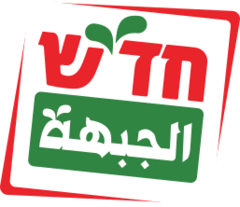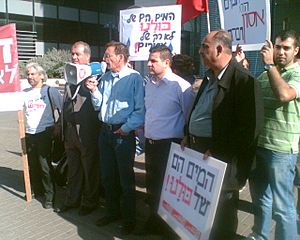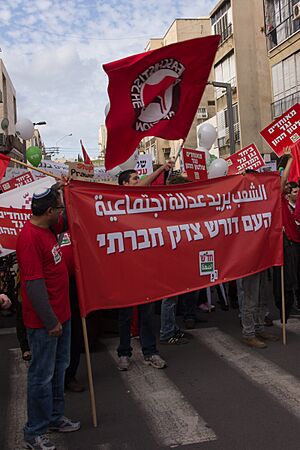Hadash facts for kids
Quick facts for kids
Hadash
חד״ש
|
|
|---|---|
 |
|
| Hebrew name | החזית הדמוקרטית לשלום ולשוויון |
| Arabic name | الجبهة الديمقراطية للسلام والمساواة |
| Leader | Ayman Odeh |
| Founded | 15 March 1977 |
| Merger of | Rakah Black Panthers (partial) Moked (partial) Other Arab and left-wing groups |
| Headquarters | Haifa, Israel Nazareth, Israel |
| Ideology |
|
| Political position | Left-wing to far-left |
| National affiliation | Joint List (2015–2019; 2020–2022) |
| Colors | Red and Green |
| Knesset |
3 / 120
|
| Election symbol | |
| ו | |


Hadash is a political group in Israel. It is known for its left-wing ideas. The name Hadash comes from a Hebrew phrase meaning "The Democratic Front for Peace and Equality." It was formed by the Communist Party of Israel and other groups who share similar ideas.
Contents
What is Hadash?
Hadash is a political alliance. This means it's a group of different parties and people working together. They focus on peace and equality for everyone in Israel. Their main goal is to create a fair society.
Hadash's Main Ideas
Hadash supports a socialist economy. This means they believe the government should control important industries. They also strongly support workers' rights. This includes fair pay and good working conditions.
Hadash believes in cooperation between Jewish and Arab people. They were among the first to support a two-state solution. This idea suggests creating a Palestinian state alongside Israel.
The party wants Israel to leave all territories it has occupied since the Six-Day War. They also support the creation of a Palestinian state in the West Bank and Gaza Strip. Hadash also believes Palestinian refugees should have the right to return or receive money.
Besides peace, Hadash cares about social and environmental issues. They want Israel's natural resources, like gas and oil, to be owned by the country, not private companies.
Hadash is a non-Zionist party. This means they do not support the idea of Israel as a Jewish state. They believe Palestinian Arabs should be recognized as a national minority in Israel.
Hadash's History
Hadash was officially formed on March 15, 1977. It was created when the New Communist List (Rakah) and other groups joined together. These groups included some members of the Black Panthers.
Early Elections
In the 1977 elections, Hadash won five seats in the Knesset. The Knesset is Israel's parliament. This was one more seat than Rakah had before. However, in the 1981 elections, they won four seats. They kept four seats in the 1984 elections. In 1988, they gained another seat when a member from another party joined them.
The 1988 election also resulted in four seats. But one member later left to form his own group. In the 1992 elections, Hadash had three seats.
Later Elections and Alliances
In 1996, Hadash joined with another party called Balad. Together, they won five seats. But they later split up, leaving Hadash with three seats. In the 1999 elections, they kept three seats.
In 2003, Hadash teamed up with Ahmed Tibi's Ta'al party. They won three seats, but again, they split during the parliamentary session. This left Hadash with two members in the Knesset.
In the 2006 elections, Hadash won three seats. They gained another seat in the 2009 elections, bringing their total to four.
In 2015, Hadash became part of the Joint List. This was a larger group of Arab-majority parties. They ran together in several elections. In the 2022 Israeli election, Hadash ran as part of a joint list with Ta'al. They won four seats.
Election Results Overview
Hadash has participated in many Israeli elections. The table below shows how many votes and seats they won over the years. The number of seats they hold in the Knesset changes with each election.
| Election | Votes | % | Seats | +/– | Knesset members |
|---|---|---|---|---|---|
| 1977 | 80,118 | 4.6 |
5 / 120
|
– | Charlie Biton, Avraham Levenbraun (replaced by Hanna Mwais), Tawfik Toubi, Meir Vilner, Tawfiq Ziad |
| 1981 | 64,918 | 3.4 |
4 / 120
|
Charlie Biton, Tawfik Toubi, Meir Vilner, Tawfiq Ziad | |
| 1984 | 69,815 | 3.4 |
4 / 120
|
Charlie Biton, Tawfik Toubi, Meir Vilner, Tawfiq Ziad, Muhammed Wattad (joined from Mapam) | |
| 1988 | 84,032 | 3.7 |
4 / 120
|
Charlie Biton (left party during Knesset term), Tawfik Toubi (replaced by Tamar Gozansky), Meir Vilner (replaced by Hashem Mahameed), Tawfiq Ziad (replaced by Mohamed Nafa) | |
| 1992 | 62,545 | 2.4 |
3 / 120
|
Tamar Gozansky, Hashem Mahameed, Tawfiq Ziad (replaced by Saleh Saleem) | |
| 1996 | 129,455 | 4.2 |
4 / 120
|
Tamar Gozansky, Ahmad Sa'd, Saleh Saleem, Hashem Mahameed | |
| 1999 | 87,022 | 2.6 |
3 / 120
|
Mohammad Barakeh, Tamar Gozansky, Issam Makhoul | |
| 2003 | 93,819 | 3.0 |
2 / 120
|
Mohammad Barakeh, Issam Makhoul | |
| 2006 | 86,092 | 2.7 |
3 / 120
|
Mohammad Barakeh, Dov Khenin, Hana Sweid | |
| 2009 | 112,130 | 3.3 |
4 / 120
|
Mohammad Barakeh, Dov Khenin, Hana Sweid, Afu Agbaria | |
| 2013 | 113,439 | 3.0 |
4 / 120
|
Mohammad Barakeh, Dov Khenin, Hana Sweid, Afu Agbaria | |
| 2015 | Part of the Joint List |
5 / 120
|
Ayman Odeh, Aida Touma-Suleiman, Dov Khenin, Yousef Jabareen, Abdullah Abu Ma'aruf, Youssef Atauna | ||
| April 2019 | 193,442 | 4.49 |
4 / 120
|
Ayman Odeh, Aida Touma-Suleiman, Ofer Cassif, Yousef Jabareen | |
| September 2019 | Part of the Joint List |
5 / 120
|
Ayman Odeh, Aida Touma-Suleiman, Ofer Cassif, Yousef Jabareen, Jabar Asatra | ||
| 2020 | Part of the Joint List |
5 / 120
|
Ayman Odeh, Aida Touma-Suleiman, Ofer Cassif, Yousef Jabareen, Jabar Asatra | ||
| 2021 | Part of the Joint List |
3 / 120
|
Ayman Odeh, Aida Touma-Suleiman, Ofer Cassif | ||
| 2022 | 178,735 | 3.75 |
4 / 120
|
Ayman Odeh, Aida Touma-Suleiman, Ofer Cassif, Youssef Atauna (replaced by Ta'al MK Samir Bin Said on 23 June 2025) | |
Leaders of Hadash
Hadash has had several important leaders over the years. These leaders help guide the party and its goals.
- Meir Vilner was the chairman from 1976 to 1992.
- Tawfiq Ziad served as chairman from 1992 to 1994.
- Saleh Saleem was chairman from 1996 to 1999.
- Tawfik Toubi was the secretary-general from 1989 to 1993.
- Mohammad Barakeh was secretary-general from 1993 to 1999. He then became chairman from 1999 to 2015.
- Ayman Odeh has been the secretary-general since 2006. He became chairman in 2015 and still holds that position.
See also
 In Spanish: Jadash para niños
In Spanish: Jadash para niños
 | William Lucy |
 | Charles Hayes |
 | Cleveland Robinson |

